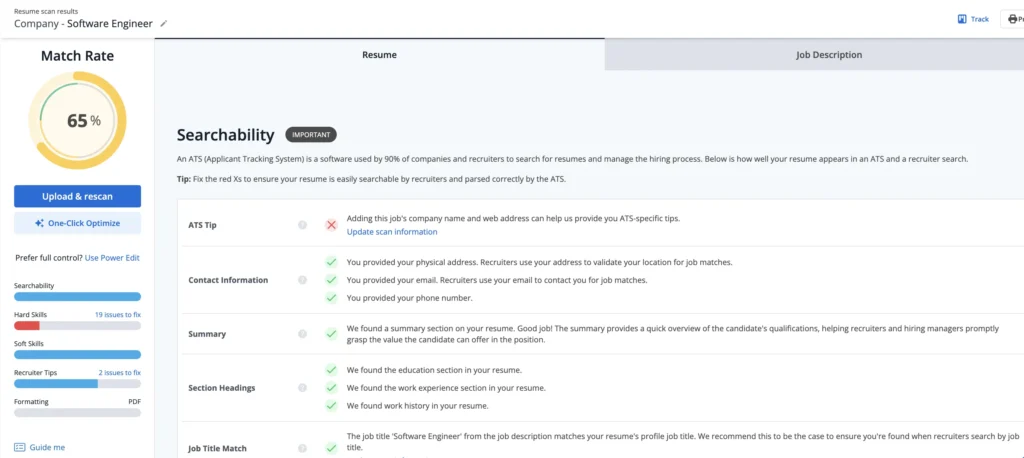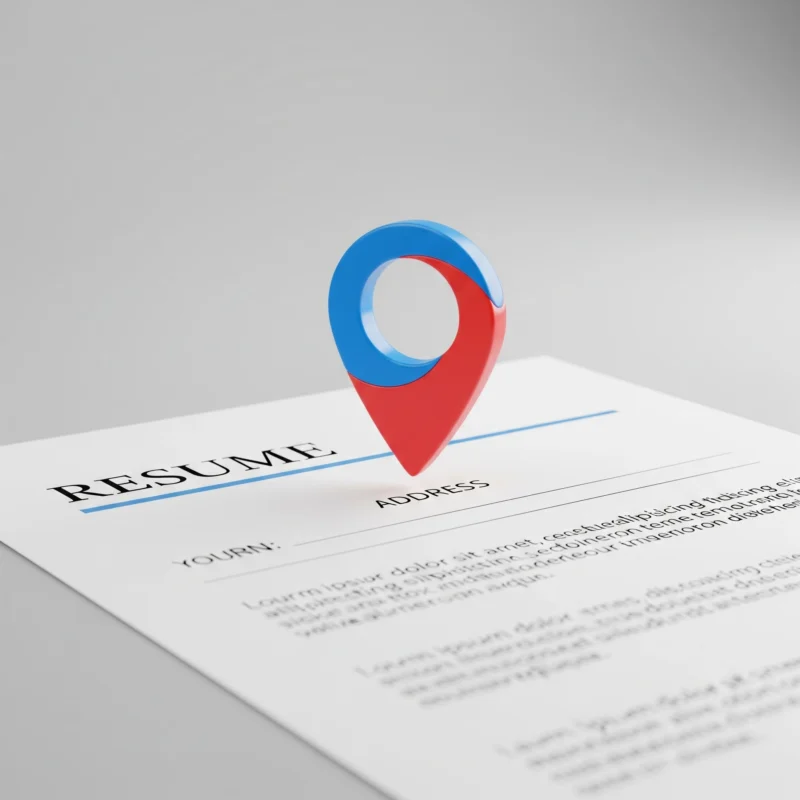Are applicants still required to put their address on a resume?
As we’ve learned from other resume traditions like objective statements, poor resume writing habits die hard. However, many job applications continue to ask for your exact address, and if you’re working from a resume template, there’s a good chance it, too, will include space for your home address.
But are addresses on resumes still necessary? And are there benefits to including your address on your resume?
In this article, we’ll cover the potential benefits of including an address on your resume, reasons to leave it off, and the best way to share your location while still keeping your street address private. Plus we’ll talk about what role addresses play on other specific resumes.
Read more: 60 Resume Tips to Help You Land Interviews
In your resume, the address is typically placed in the header, below your name and contact information. It usually includes your street address, city, state, and zip code. Some individuals choose to include only the city and state for privacy or to avoid a crowded resume header.
Read more: What to Put On A Resume To Stand Out To Recruiters
Adding an address on your resume: Yes or no?
Should you put your own address on your resume?
“No,” says Steven Mostyn, the Chief Human Resources Officer at Management.org. “Job seekers generally no longer need to include their home address on their resume.”
“The traditional practice of listing a home address has become outdated due to privacy concerns and the increasing prevalence of remote work,” Mostyn added. “Many employers now prioritize contact information, like email addresses, phone numbers, and LinkedIn profiles, which are sufficient for communication.”
You should include your city and state when writing your resume, even if you’re a remote candidate, but that’s it.
Below are 4 reasons why you should still add at least a location:
1. Improving ATS visibility
The strongest argument for including your address is so that you will show up in location-specific recruiter searches.
In fact, 43.4% of recruiters filter candidates by location when using an ATS, according to Jobscan’s State of the Job Search 2025 report.
If you’ve made your resume searchable on job sites but have not included your location, it’s likely you haven’t been contacted by recruiters.
In fact, the best way to improve your resume overall is by updating and optimizing it for ATS. This is a computer software program that most companies use today to sort and filter job applications. When you submit your application, it doesn’t go to a hiring manager – it goes directly into an ATS database. Over 98% of Fortune 500 companies use ATS to simplify their hiring process and sort through resumes quickly and efficiently.
Using free tools like Jobscan’s resume scanner (seen below) is the best way to immediately check how searchable your resume is for recruiters. Just upload your resume and job description, and you’ll have results in seconds.
- Add your resume file or paste the text into the scanner.
- Copy and paste the job listing text into the scanner.
- Click “Scan.”
After that, you’ll receive a Match Rate score, seen in the image below. From here, you will get tailored advice to enhance your skills, experience, and writing. Then, just update and rescan your resume until you hit 75% or higher!

You can see in the image below we’ve highlighted exactly what the report will tell you about including your address, and if it’s formatted correctly or not.

You can also easily optimize your resume with One-Click Optimize, allowing you to quickly add all of the right skills, work experience, education, and more with a single tap of your mouse.
Read more: How to Write a Resume for Today’s Job Market
2. If you’re looking for remote work
One of the big benefits of working remotely is that you can do it from anywhere. Perhaps you’re traveling the world or living in a rural area far from an office center. As long as you have the right tech, you’re good to go. So is there really a need to include your location on your resume?
Maybe. Many employers want to know which timezone you’re in to ensure your working hours are compatible with theirs. Including your city and state could qualify you as timezone-compatible and help you in the recruiting process.
It is worth noting that some remote workers don’t like to disclose their locations because they’re concerned employers might want to adjust pay to the cost of living in their areas.
In this case, including your location on your resume is a personal decision, but do consider that you’ll be asked where you’re located during the interview process, anyway. Overall, it seems including your city and state on your resume can do more good than harm.
3. If you’re considering relocation
Another reason to include your address is so that employers will know whether or not you’ll need to relocate for the job.
Tip: If you are searching for a job outside of your current area, put “Relocating to City, State” in place of your address, so that you appear in recruiter searches and communicate to employers that you are already moving to the area. Here’s what that looks like:
Joe Jobscan | Relocating to Seattle, WA | 555-555-5555 | joe@jobscan.co | linkedin.com/in/j-jobscan
4. To comply with regulations
Employers often face different legal and tax rules in each state or region. Including your city and state helps employers check if you meet local laws. They need to know if you meet geographic requirements.
Some roles, like teachers and healthcare workers, need state licenses. They are tied to geographic eligibility. Some companies adjust salaries according to the cost of living in your area or the pay laws mandated by the state. Your location helps speed up this evaluation.
“The city and state are critical because, due to HR tax laws, companies need to ensure the candidate lives in a state aligned with their payroll policies,” said Megan Dias, a Career Services Coach at Parsity.
This transparency shows your awareness of the requirements. It also saves time by addressing any location-specific concerns. It’s a simple step. It keeps you competitive for region-sensitive roles.
How to write your address on your resume
While you don’t need to include details like your street name or apartment number, you should still include the following in the contact section of your resume:
- Town or city
- State
- Zip code
Employers are usually interested in knowing your general location, especially if you are required to commute to an office.
“I generally would like to keep my search under a 20-mile radius,” a tech recruiter told Jobscan. “Sometimes I would even do five miles.”
But what if you’re willing to move to a new city?
If you’re living in San Antonio and trying to relocate to Seattle, having only “San Antonio” on your resume could knock you out of consideration.
Meanwhile, only having “Seattle” in your contact section despite all your work experience being in San Antonio could be a red flag.
Be transparent. List both on your resume like this: “Seattle, WA (relocating from San Antonio, TX)” or “San Antonio, TX (relocating to Seattle, WA).” You always want to avoid lying on your resume.
Joe Jobscan | Seattle, WA |555-555-5555 | joe@jobscan.co | linkedin.com/in/joe-jobscan
Read more: How to Make Your Resume Stand Out to Recruiters
Cons of putting your home address on your resume
Privacy issues
Sharing your full address online makes you vulnerable to privacy breaches. Scammers or hackers could misuse your resume for identity theft, fraud, or harm.
“Including your full address can expose you to privacy risks. With the ease of online searches, sharing personal information can lead to unwanted attention or even identity theft,” Amit Doshi, the Founder & CEO of MyTurn, told Jobscan.
With job searches now mostly online, limit location details to city and state. This reduces risks while still giving recruiters some geographic info. Protecting your personal data is key.
Hiring bias
Including your full address on your resume may unintentionally expose you to hiring bias. Employers might assume things based on your neighborhood’s status, crime, or demographics. Though illegal, such biases—conscious or not—can unfairly affect their decisions. They may exclude you from opportunities. Keeping your location to just city and state helps prevent this.
“By not including your home address, you help minimize potential bias associated with certain locations, Doshi also said. “This encourages a more merit-based evaluation of your application.”
Commute concerns
Listing your full address might lead employers to speculate about your ability to commute. A distant location could raise doubts about punctuality and commitment for in-office roles.
Even if you’re willing to relocate or manage the commute, these assumptions could harm your chances. Including only your city and state keeps recruiters focused on your skills, not your travel time.
How to list your location on LinkedIn?
Updating your LinkedIn location helps recruiters find you in searches that matter. A precise location also improves your visibility in LinkedIn’s recruiter filters. Here’s how to edit or list your location on your LinkedIn profile.
1. Click the Me icon at the top of your homepage.
2. Select View Profile.
3. Click the Edit icon in your introduction section.
4. Scroll to the Location field and select your Country/Region (required). You’ll also be able to add your City/District and Postal Code.
5. Once updated, click Save.
What other information should you include in your resume header?
Make your contact info easy to find at the top of your resume in the header. You want employers to reach you easily.
Besides your address, here’s what else you should include in your contact section:
- Full name: Your name should be the most prominent part of your contact info. It should be at the top of the page and in a larger font than the rest of your text. Include any titles or professional designations.
- Professional email address: Don’t use your current employer’s email, as it appears unprofessional and inappropriate for job searching.
- Contact number: This can be your landline number or your cell phone number. It’s not necessary to include both as this will only confuse the hiring manager. Make sure the phone number listed is one that you feel comfortable having potential employers contact.
- LinkedIn URL or link to portfolio (Optional): This gives employers additional insight into your experience, education, and skillset.
Here’s an example of what a contact information section might look like:

FAQ
No, a full address isn’t necessary. Include only your city and state. This will help you appear in location-specific ATS searches. It will also protect your privacy and avoid bias or commute assumptions.
Yes, remove your full address. Use just your city and state to maintain professionalism, protect privacy, and align with modern hiring practices. Add “Relocating to [City, State]” if relevant.
No, include only your city and state if location is important. Use the cover letter to highlight your skills and mention relocation flexibility if applicable.
Include your name, city and state, phone number, professional email, and optional LinkedIn or portfolio URL. Keep it clean and relevant to the role.
A typical resume should be one or two pages long, but this can vary depending on the resume.
What should a resume look like to get you as close to perfect as possible? Your resume should have relevant information in a readable format, like having a short summary, a job-specific headline, and relevant work experience, to name a few.














